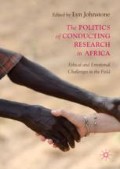Abstract
The chapter looks at the effects of sexualized identity and desire on the process of data production through a discussion of flirting in the field. In an attempt to generate new insights into different gender and power dynamics during the research process, as well as illustrate the effect that these dynamics might have on the type as well as the amount of data we produce and collect, Lyn Johnstone offers four glimpses into ways in which she encountered and reciprocated flirtatious banter directed by my male interviewees during fieldwork encounters in Rwanda and Zimbabwe. Exploring the role that agency, power, and performance play in such flirtatious encounters, the chapter discusses the ways in which flirtation can both impede and facilitate data production.
Access this chapter
Tax calculation will be finalised at checkout
Purchases are for personal use only
References
Ackerly, B., Stern, M., & True, J. (Eds.). (2006). Feminist Methodologies for International Relations. Cambridge: Cambridge University Press.
Agar, M. (2006). An Ethnography by Any Other Name. Forum: Qualitative Social Research Socialforschung, 7(4). http://www.qualitative-research.net/index.php/fqs/article/view/177. Accessed December 15, 2017.
Arendell, T. (1997). Reflections on the Researcher-Researched Relationship: A Woman Interviewing Men. Qualitative Sociology, 20, 341–365.
Bell, D. (1995). [Screw]ing Geography (Censor’s Version). Environment and Planning D: Society and Space, 13, 127–131.
Bell, D. (2007). Fucking Geography, Again. In K. Browne, J. Lim, & G. Brown (Eds.), Geographies of Sexualities: Theory, Practices and Politics (pp. 81–88). Farnham: Ashgate.
Binnie, J. (1997). Coming out of Geography: Towards a Queer Epistemology? Environment and Planning D: Society and Space, 15, 223–237.
Butler, J. (1990). Gender Trouble. London: Routledge.
Caplan, P. (1993). Learning Gender: Fieldwork in a Tanzanian Coastal Village, 1965–85. In D. Bell, P. Caplan, & W. J. Karim (Eds.), Gendered Fields: Women, Men and Ethnography (pp. 168–181). London: Routledge.
Chattopadhyay, S. (2013). Getting Personal While Narrating the “Field”: A Researchers Journey to the Villages of the Narmada Valley. Gender, Place and Culture: A Journal of Feminist Geography, 20(2), 137–159.
Clark, I., & Grant, A. (2015). Sexuality and Danger in the Field: Starting an Uncomfortable Conversation. Journal of the Anthropological Society of Oxford, 7(1), 1–14.
Cupples, J. (2002). The Field as a Landscape of Desire: Sex and Sexuality in Geographical Fieldwork. Area, 34(4), 382–390.
Diprose, G., Thomas, A. C., & Rushton, R. (2013). Desiring More: Complicating Understandings of Sexuality in Research Processes. Area, 45(3), 292–298.
England, K. (1994). Getting Personal: Refexivity, Positionality, and Feminist Research. Professional Geographer, 46(1), 80–89.
Gallagher, J. (2016). Interviews as Catastrophic Encounters: An Object Relations Methodology for IR Research. International Studies Perspectives, 17(4), 445–461.
Gibson-Graham, J. K. (1994). “Stuffed If I Know!”: Reflections on Post-modern Feminist Social Research. Gender, Place and Culture, 1, 205–224.
Gilbert, M. R. (1994). The Politics of Location: Doing Feminist Research “At Home”. Professional Geographer, 46, 90–96.
Gilchrist, V. J. (1999). Key Informant Interviews. In B. F. Crabtree & W. L. Miller (Eds.), Doing Qualitative Research (pp. 70–89). Thousand Oaks, CA: Sage.
Grenz, S. (2005). Intersections of Sex and Power in Research on Prostitution: A Female Researcher Interviewing Male Heterosexual Clients. Signs, 30(4), 2091–2113.
Haraway, D. J. (1988). Situated Knowledges: The Science Question in Feminism and the Privilege of Partial Perspective. Feminist Studies, 14(3), 575–599.
Jacoby, T. (2006). From the Trenches: Dilemmas of Feminist IR Fieldwork. In B. Ackerly, M. Stern, & J. True (Eds.), Feminist Methodologies for International Relations (pp. 153–173). Cambridge: Cambridge University Press.
Kaspar, H., & Landolt, S. (2016). Flirting in the Field: Shifting Positionalities and Power Relations in Innocuous Sexualisations of Research Encounters. Gender, Place and Culture, 23(1), 107–119.
Martin, P. Y. (2003). “Said and Done” Versus “Saying and Doing”: Gendering Practices, Practicing Gender at Work. Gender and Society, 17(3), 342–366.
Mattingly, D., & Falconer-Al-Hindi, K. (1995). Should Women Count? A Context for the Debate. Professional Geographer, 47, 27–35.
McDowell, L. (1988). Coming in From the Dark Feminist Research in Geography. In J. Eyles (Ed.), Research in Human Geography (pp. 154–173). Oxford: Blackwell.
McDowell, L. (1992). Doing Gender: Feminism, Feminists and Research Methods in Human Geography. Transactions. Institute of British Geographers, 17, 399–416.
Moreno, E. (1995). Rape in the Field: Reflections From a Survivor. In D. Kulick & M. Wilson (Eds.), Taboo: Sex, Identity and Erotic Subjectivity in Immersed Anthropological Fieldwork (pp. 219–250). London and New York: Routledge.
Morton, H. (1995). My Chastity Belt: Avoiding Seduction in Tonga. In D. Kulick & M. Wilson (Eds.), Taboo: Sex, Identity and Erotic Subjectivity in Anthropological Fieldwork (pp. 168–185). London: Routledge.
Nast, H. J. (1994). Opening Remarks on “Women in the Field”. Professional Geographer, 46, 54–66.
Newton, E. (1993). My Best Informant’s Dress: The Erotic Equation in Fieldwork. Cultural Anthropology, 8, 3–23.
Parr, H. (1996). Mental Health, Ethnography and the Body: Implications for Geographical Research. Paper Presented at a Conference on Feminist Methodologies, Nottingham.
Rose, G. (1997). Situating Knowledges: Positionality, Reflexivities and Other Tactics. Progress in Human Geography, 21(3), 305–320.
Sundberg, J. (2003). Masculinist Epistemologies and the Politics of Fieldwork in Latin Americanist Geography. The Professional Geographer, 55(2), 180–190.
Valentine, G. (2002). People Like Us: Negotiating Sameness and Difference in the Research Process. In P. Moss (Ed.), Feminist Geography in Practice: Research and Methods (pp. 116–126). Oxford: Blackwell.
Author information
Authors and Affiliations
Editor information
Editors and Affiliations
Rights and permissions
Copyright information
© 2019 The Author(s)
About this chapter
Cite this chapter
Johnstone, L. (2019). Landscapes of Desire: The Effect of Gender, Sexualized Identity, and Flirting on Data Production in Rwanda and Zimbabwe. In: Johnstone, L. (eds) The Politics of Conducting Research in Africa. Palgrave Macmillan, Cham. https://doi.org/10.1007/978-3-319-95531-5_5
Download citation
DOI: https://doi.org/10.1007/978-3-319-95531-5_5
Published:
Publisher Name: Palgrave Macmillan, Cham
Print ISBN: 978-3-319-95530-8
Online ISBN: 978-3-319-95531-5
eBook Packages: Political Science and International StudiesPolitical Science and International Studies (R0)

